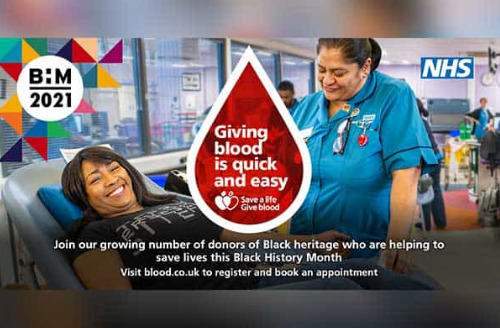As part of Black History Month, we want to make you aware of an important issue that heavily affects the Black, Asian and Minority Ethnic (BAME) community. In the UK, there is a shortage of BAME blood donors.

By becoming a blood donor you could potentially save someone’s life and help people undergoing long-term treatments. We especially need more blood donors from BAME communities to help:
- give blood transfusions to people who need blood that is closely matched to their own
- treat people who suffer from thalassaemia (which mainly affects people with a South Asian or Mediterranean heritage) or sickle cell (which is particularly prevalent in the black community).
What is Thalassaemia?
Thalassaemia is an inherited condition which either produces no or little haemoglobin in the blood. Haemoglobin helps red blood cells to carry oxygen around the body, for the body to function properly.
The key symptom of thalassaemia is anaemia, which can make people tired, short of breath, pale and have heart palpitations. As well as this, some people can experience delayed growth, fragile bones and reduced fertility.
Blood transfusions can be vital to prevent anaemia and in severe cases can be needed around once a month.
What is sickle cell disease?
Sickle cell is another type of inherited health condition, which causes red blood cells to be unusually shaped. This can mean they don’t live as long as healthy blood cells and can cause blood vessels to block.
Most people who are born with sickle cell experience problems in early childhood. The disease can cause painful episodes that can last up to a week, increase risk of infections and anaemia.
If their symptoms get worse or there is clear damage from sickle cell, patients need regular blood transfusions.
Who can give blood and how?
To give blood you must fit the following requirements:
- You are fit and healthy
- You weigh between 7 stone 12 lbs and 25 stone, or 50kg and 158kg
- You are aged between 17 and 66 (or 70 if you have given blood before)
To regularly give blood, men can give it every 12 weeks and women can give blood every 16 weeks.
Even if you’re in part of the country in a local lockdown due to COVID-19, you can still give blood and help vulnerable BAME patients. To become a blood donor all you need to do is register your details online and answer a few basic questions.

